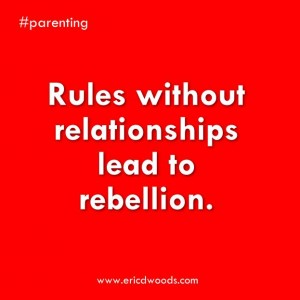 “Wait, that’s not fair!” one of them shouted, throwing his arms up in the air. And then came the famous words I remember uttering as a kid myself, “You can’t make up the rules as you go along.”
“Wait, that’s not fair!” one of them shouted, throwing his arms up in the air. And then came the famous words I remember uttering as a kid myself, “You can’t make up the rules as you go along.”
My 11- and 13-year-old sons had two teenage friends over for the night to play with airsoft guns, light things on fire, and sleep in a tent—typical boy stuff. But before this game even started, they had spent twenty minutes negotiating the terms of the game: the rules, the teams, the boundaries, and how to win.
And then it hit me, all this worked not because of the carefully thought-out system of play, but because these boys were friends. One of my college professors at John Brown University, in a class either on youth ministry or camp management, told us this: rules without relationships lead to rebellion. And this is the premise, that in parenting, in youth ministry, or in organizational leadership, rules are just rules—and likely to be broken—unless they are expressed in the context of personal loving and caring relationships.
Romans 5:8 presents the same pattern in the way God relates to us. It reads, “But God demonstrates his own love for us in this: While we were still sinners, Christ died for us.”
Here are three keys to understanding the rules-relationship dynamic from this passage:
1. Lead with the relationship.
God did. Look what it says, that the first thing God did was to restore the broken relationship between Him and us, through the death and subsequent resurrection of his Son Jesus Christ. God did everything He could, on His side, to make a relationship with us possible before he had any reasonable expectation of how we would respond. It required tremendous sacrifice. And it demonstrated love.
True relationships require sacrifice, and a consistent demonstration of love, regardless of reciprocation. We demonstrate these things for our children every time we drive them to practice, cheer them on, fix them dinner, and gather around the table to play Rummikub.
As a youth pastor, I remember doing many of these same things. I went to where my students were, cheered them on, served them in numerous ways, and set aside time with them to let them know how much I cared for them as people.
At time, it requires tremendous sacrifice, and it always demonstrates love.
2. Recognize that rules are transformational.
Romans 5:8 says that we were sinners. A couple chapters later in Romans 7:7, Paul says, “I would not have known what sin was had it not been for the law.” The law then—the rules—are a tool for transformation, showing us where we have deviated from God’s plan, and giving us a right framework for living within it.
Just west of town, our 4-lane highway turns to two. But the outside lane does not end abruptly, though it might seem that would be the most efficient use of asphalt. No, over a period of hundreds of feet, a sequence of events ensures that all traffic is in the correct lane. First, a sign to let the driver know change is coming. Second, a gradual angle in the white line to provide direction to merging traffic. Then, a set of rumble strips to keep cars on track.
Good rules, then, do not only prohibit bad behavior, but also provide guidelines for increasing consistency with what is expected, and with what is good and right. They let us know of our need for compliance and the changes ahead. They provide direction for life change. And they give us indication when we are headed off track.
3. Love.
In His sacrifice and in the rules He has given us for life, Romans 5:8 says God is demonstrating His love for us. We must see the establishment of rules as a demonstration of love.
Good rules protect the ones we love. They protect them from self-destruction. They protect them from harming others. And they protect them from the slow path to complacent collapse.
Good rules encourage the ones we love to a life of holiness, godliness, and right living. They give them the opportunity to succeed, and build upon each victory over sin. They give them a path to win.
Good rules give us the opportunity to demonstrate grace. And, while we must be careful not to create a circumstance where rules are broken in the expectation of grace (Romans 6:1), we must not be afraid to offer it just as our Father has offered it so abundantly—and repeatedly—to us.
My boys and their friends finally got the rules to their game figured out. I don’t know who won the game—after all, that wasn’t really the point. The game was just something to do while they spent time together.